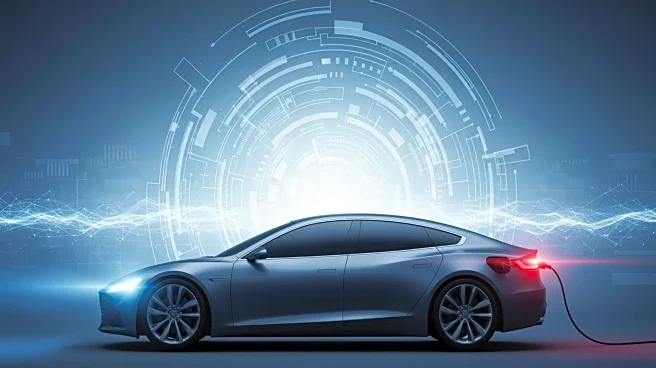What's Happening?
Nissan has introduced the all-new 2026 LEAF EV, marking a significant update to one of the pioneering electric vehicles in the U.S. market. The new model adopts a crossover compact SUV design, inspired by the Ariya EV, and aims to maintain affordability
with a starting price in the low $30,000s, potentially reaching $40,000 for higher trims. Despite the design overhaul, Nissan is committed to keeping monthly payments similar to the current model, which starts at $28,140. The 2026 LEAF will feature a front-wheel-drive configuration with a single electric motor, offering an estimated range of 303 miles, a substantial increase from the current model's 212-mile range. Additionally, the vehicle will include Tesla's NACS inlet port, facilitating access to Tesla's Supercharger network. However, the LEAF faces a 25% tariff due to its Japanese manufacturing, potentially adding $7,500 to its cost.
Why It's Important?
The launch of the 2026 LEAF EV is crucial for Nissan as it navigates financial challenges, including a $4.6 billion net loss in fiscal 2024 and plans to cut 20,000 jobs and close seven plants by 2027. The new LEAF is part of Nissan's strategy to release 10 new and updated vehicles in North America by 2027, aiming to regain market share and improve profitability. The vehicle's competitive pricing and extended range position it as a potential rival to Tesla's Model 3, which starts at approximately $42,500. However, the tariffs imposed by President Trump on Japanese-built vehicles could hinder its market competitiveness by increasing consumer costs. Nissan's ability to absorb or pass on these costs will significantly impact its success in the U.S. market.
What's Next?
Nissan's future actions will likely focus on mitigating the impact of tariffs and enhancing its market position in the U.S. and China. The company may seek to negotiate trade agreements to reduce tariff burdens or explore local manufacturing options to circumvent these costs. Additionally, Nissan's strategy to introduce a series of new models by 2027 will be critical in revitalizing its brand and financial standing. The automotive industry will closely watch how Nissan navigates these challenges and whether the new LEAF can capture a significant share of the growing EV market.
















